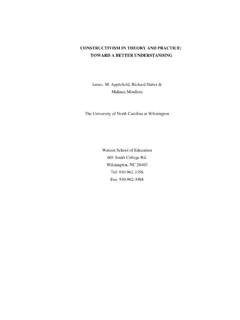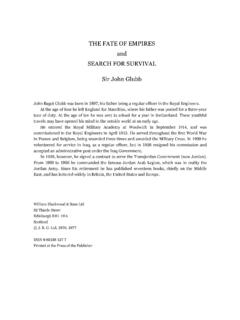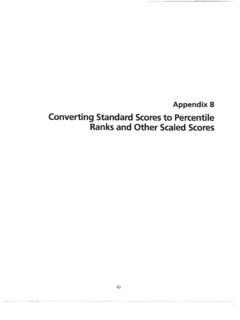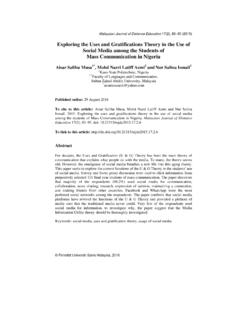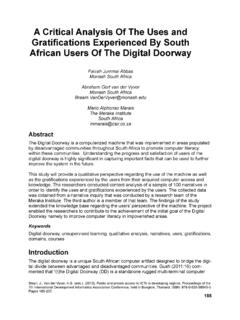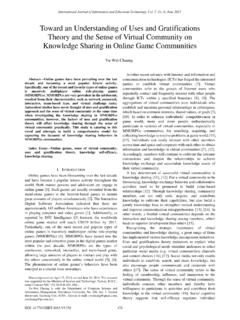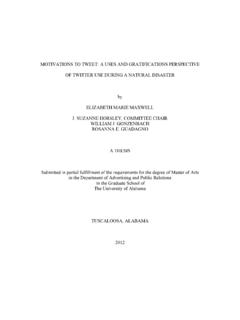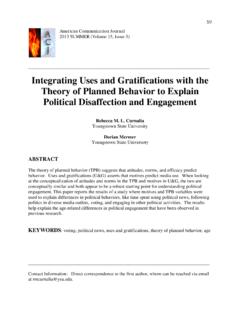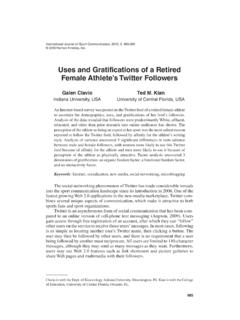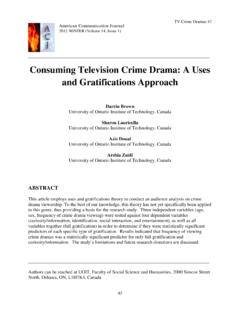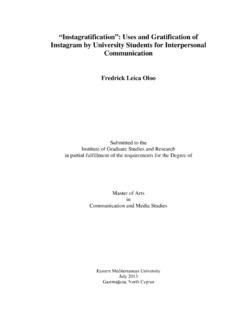Transcription of 28 Uses and Gratifications of Elihu Katz
1 28 uses and Gratifications of Elihu Katz A First Look at Communication theory 9th edition Em Griffin Andrew Ledbetter Glenn Sparks Copyright 2015 McGraw-Hill Education. All rights reserved. No reproduction or distribution without the prior written consent of McGraw-Hill Education. Slide 2. uses and Gratifications Instead of asking What do media do to people? . Copyright 2015 McGraw-Hill Education. All rights reserved. No reproduction or distribution without the prior written consent of McGraw-Hill Education. uses and Gratifications Ask What do people do with media? . Copyright 2015 McGraw-Hill Education. All rights reserved. No reproduction or distribution without the prior written consent of McGraw-Hill Education. Slide 4. Five Key Assumptions People Use Media for Their Own Particular Purposes People Seek to Gratify Needs Media Compete for Your Attention and Time Media Affect Different People Differently People Can Accurately Report Their Media Use and Motivation continued Copyright 2015 McGraw-Hill Education.
2 All rights reserved. No reproduction or distribution without the prior written consent of McGraw-Hill Education. Slide 5. People Use Media for Their Own Particular Purposes The study of how media affect people must take account of the fact that people deliberately use media for particular purposes uses and Gratifications known for deliberate shift away from notion that powerful media messages have uniform effects on large audiences Copyright 2015 McGraw-Hill Education. All rights reserved. No reproduction or distribution without the prior written consent of McGraw-Hill Education. Copyright 2015 McGraw-Hill Education. All rights reserved. No reproduction or distribution without the prior written consent of McGraw-Hill Education. Slide 7. People Seek to Gratify Needs Deliberate choices people make using media presumably based on Gratifications they seek from that media Straight-line effect of media.
3 Specific effect on behavior that is predicted from media content alone . with little consideration of the differences in people who consume that content Copyright 2015 McGraw-Hill Education. All rights reserved. No reproduction or distribution without the prior written consent of McGraw-Hill Education. Slide 8. Media Compete for Your Attention and Time Media competes with each other for your time as well as other activities that don't involve media exposure. Copyright 2015 McGraw-Hill Education. All rights reserved. No reproduction or distribution without the prior written consent of McGraw-Hill Education. Slide 9. Media Affect Different People Differently Same media message may not affect everyone the same way Griffin's studies on effects of frightening media confirmed that media affect different people differently Twitter and the Swine flu Copyright 2015 McGraw-Hill Education.
4 All rights reserved. No reproduction or distribution without the prior written consent of McGraw-Hill Education. Slide 10. People Can Accurately Report Their Media Use and Motivation Long tradition in communication research that asks people to report the amount of time they devote to different kinds of media This tenet of the theory continues to be debated Example how do you code because I like it? . Copyright 2015 McGraw-Hill Education. All rights reserved. No reproduction or distribution without the prior written consent of McGraw-Hill Education. Slide 11. A Typology of uses and Gratifications Rubin developed 8 motivations Passing time Companionship Escape Enjoyment Social interaction Relaxation Information Excitement Copyright 2015 McGraw-Hill Education. All rights reserved. No reproduction or distribution without the prior written consent of McGraw-Hill Education.
5 Pew Research Center Mobile Facts As of January 2014. 90% of American adults have a cell phone 58% of American adults have a smartphone 32% of American adults own an e-reader 42% of American adults own a tablet computer Pew Research Copyright Center 2015 McGraw-Hill Education. All rights reserved. No reproduction or distribution without the prior written consent of McGraw-Hill Education. Pew Resarch Center Mobile Facts Copyright 2015 McGraw-Hill Education. All rights reserved. No reproduction or distribution without the prior written consent of McGraw-Hill Education. Pew Research Center Mobile Facts Some 70% of all cell phone owners and 86% of smartphone owners have used their phones in the previous 30 days to perform at least one of the following activities: Coordinate a meeting or get-together 41% of cell phone owners have done this in the past 30 days.
6 Solve an unexpected problem that they or someone else had encountered 35% have used their phones to do this in the past 30 days. Decide whether to visit a business, such as a restaurant 30%. have used their phone to do this in the past 30 days. Copyright 2015 McGraw-Hill Education. All rights reserved. No reproduction or distribution without the prior written consent of McGraw-Hill Education. Pew Research Center Media Facts (continued). Find information to help settle an argument they were having . 27% have used their phone to get information for that reason in the past 30 days. Look up a score of a sporting event 23% have used their phone to do that in the past 30 days. Get up-to-the-minute traffic or public transit information to find the fastest way to get somewhere 20% have used their phone to get that kind of information in the past 30 days.
7 Get help in an emergency situation 19% have used their phone to do that in the past 30 days. Copyright 2015 McGraw-Hill Education. All rights reserved. No reproduction or distribution without the prior written consent of McGraw-Hill Education. Media Dependency What effect has media use had on your life? LET'S PLAY A GAME. Copyright 2015 McGraw-Hill Education. All rights reserved. No reproduction or distribution without the prior written consent of McGraw-Hill Education. Slide 17. Parasocial Relationships Using Media to Have a Fantasy Friend Parasocial relationship . sense of friendship or emotional attachment that develops between TV viewers and media personalities Knowing which media consumers will form parasocial relationships can help researchers predict how media will affect different viewers in different ways Copyright 2015 McGraw-Hill Education.
8 All rights reserved. No reproduction or distribution without the prior written consent of McGraw-Hill Education. Slide 18. Critique: Heavy on Description and Light on Prediction? One criticism is that theory is a descriptive typology of media uses and Gratifications theory is not overly complex, but relies on ability of people to accurately report reasons for their media use Assumes users are active participants in the media choices they make Copyright 2015 McGraw-Hill Education. All rights reserved. No reproduction or distribution without the prior written consent of McGraw-Hill Education.
